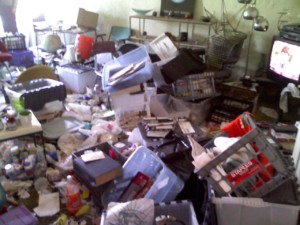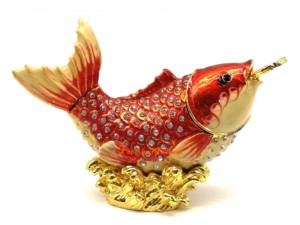
Twice in one week, two clients asked me about clutter and why it was not emphasized in my consultation. In both cases, the clients had a level of clutter which might bother me personally, as a neat freak, but not in any way approach the level of hoarding or cause real Feng Shui problems. Additionally, both clients asked me if it was “bad feng shui” to store things under their bed. To the contrary, utilizing space under a bed for storage can be one nifty way to reduce clutter!
Back in the 1990’s and early 2000’s there were some very popular authors who wrote Organizing books pretending to be Feng Shui books. More times than I can count, people would come up to me after finding out I am a feng shui practitioner, to apologize how cluttered or messy their homes were and why they were too embarrassed to have me professionally evaluate their space. Once I explained how that is not the focus in Feng Shui and how spaces can be messy without it undermining a person’s life, then I got the wide eyes and dropped jaw. Feng Shui myths are my profession’s form of “fake news” which I have been addressing for nearly thirty years now.
Another residual trend from 20-30 years ago is the notion and marketing of Chinese knick-knacks as Feng Shui remedies. Sometimes these knick-knacks are peddled by people who genuinely believe these placebos are fundamental feng shui corrections. However, there are also certain feng shui “celebrities” who know better, but they cannot resist selling these token items, so generic that they cannot possibly work in all cases. Ironically, feng shui knick-knacks could be seen as “clutter” by those unaware of their purpose.

In both cases, with clutter and Chinese folk remedies, people have added a psychological component to every observation, which may or may not be valid or universal. One author stated years ago in her popular book that if the knives in your kitchen are dull and in need of sharpening, then your mind is dull. Really? Another popular, misleading notion is that single women will stay uncoupled if they have one night stand instead of two. With psycho-babble infiltrating so much Feng Shui literature, it is no wonder that people mocked it and did not take Feng Shui seriously during those trendy times.
Another persistent misleading trend is the way people relate to the Eight Mansion School of Feng Shui. This school focuses on the Eight basic directions, but it actually goes deeper than most adherents even know about. While I do not practice this branch of Feng Shui exclusively, there are genuine applications of this branch of Feng Shui that are usually not taught openly. The majority of books have reduced it down to just identifying each direction as relative to an element or a New Age spin created by the One-Size-Fits-All Black Hat School.
What is unfortunate about the watered down version of the Eight Mansion School (Ba Zhai) is that people make important decisions (like the purchase of a house) based on too little information. As well, personal best directions affect individuals uniquely. The Eight Mansion School and techniques extracted from Chinese Astrology influence what direction a person sits or sleeps in, their best work desk orientation and entrances to use or avoid. Some people are affected by their personal best directions, while others are influenced by more objective circumstances. Not everyone experiences a Feng Shui predicament with the same potency and that is why extreme edicts should not be made or done rarely with caution.
Author: Kartar Diamond
Company: Feng Shui Solutions ®
From the Feng Shui Theory Blog Series

